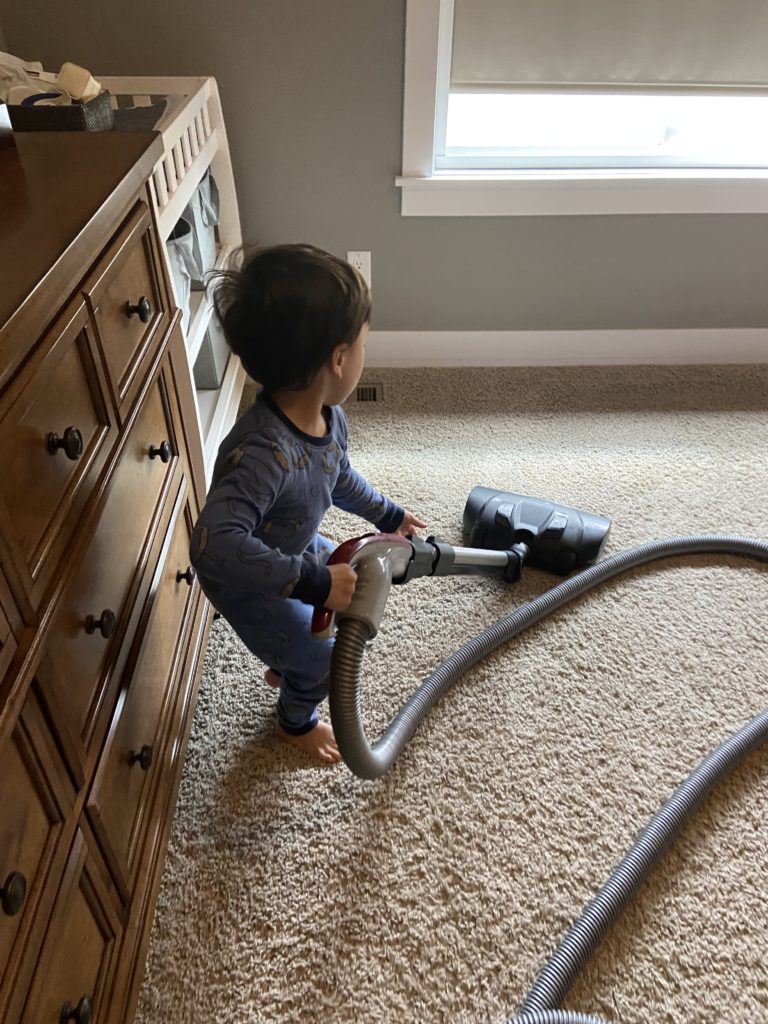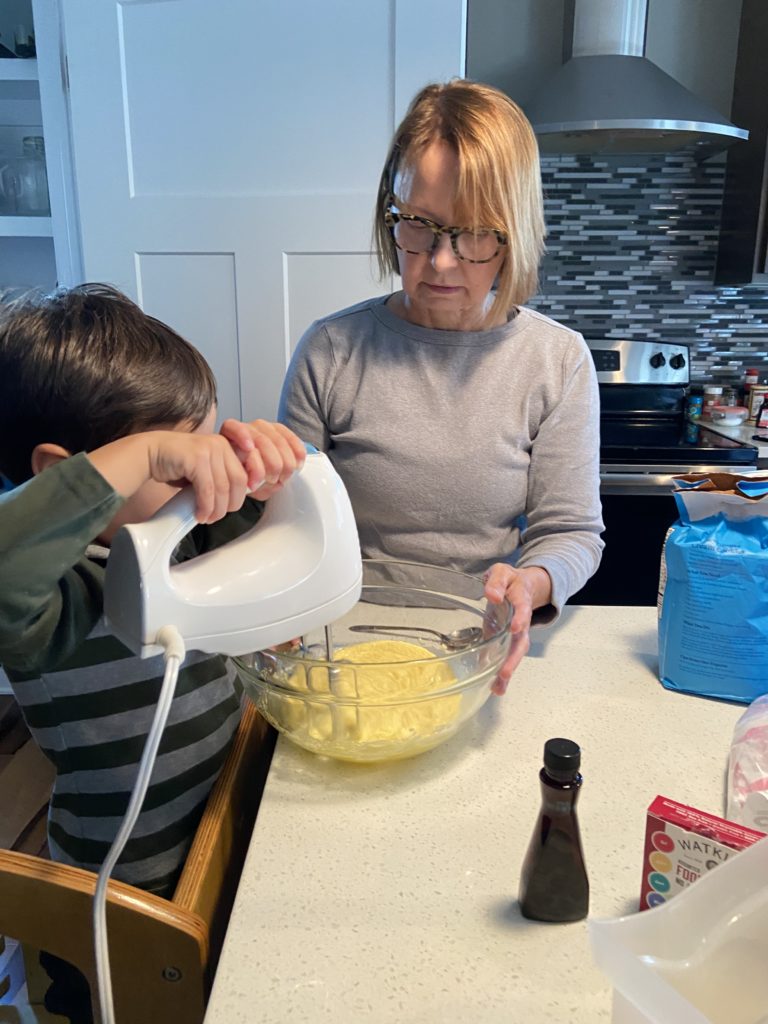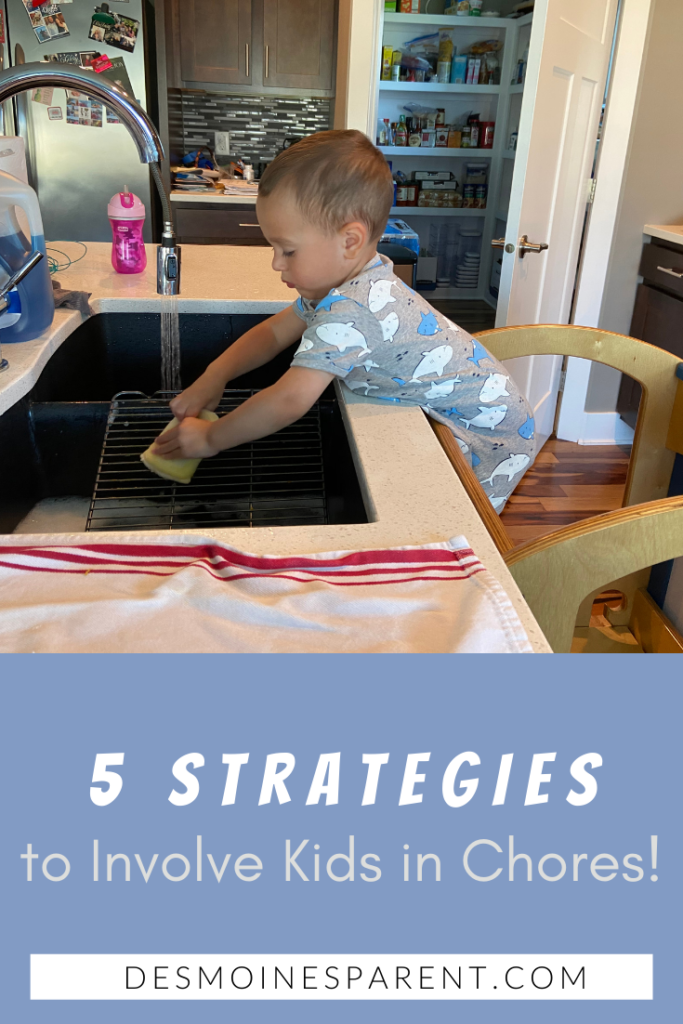Sharing is caring!
5 Strategies to Help Involve Your Kids with Chores
Often we wait for our little ones to go to sleep before we complete chores or give them screen time or even just tell them to go play. When our kids try to help it takes longer or makes even more of a mess. As busy parents, it’s often just easier and more efficient to do things ourselves. But maybe we should look at things another way.
The magical thing about young children is that they mostly all love to help and they want to be with us. They want to do things and they want to be independent. Even my 13-month-old loves having a job to do. If we can figure out how to involve them early on, then later they may be more likely to help and anticipate what needs to be done before being asked. It also helps build their confidence and feeling like they are part of the family team. As an occupational therapist, I help kids gain independence for self-care and play tasks and develop skills such as fine motor, gross motor, and coordination. Chores can help develop all of these skills too!
Here are 5 strategies to help involve your kids with chores.
Incorporate chores into your daily routine
Kids crave consistency. They want to know what to expect and tend to feel more secure having a regular routine. At bedtime with my 4-year-old, I like to review the day and then discuss plans for the day ahead to help prepare him. Consistent chores can also help with this predictable routine. For example, my oldest son knows that at mealtime he brings his plate to the counter, then he gets a warm washcloth to wipe his hands. Then I clean up and he either helps with the dishes or plays until it’s time to clean the table and then he helps spray it. This routine helps us get through mealtime and clean up efficiently.
Complete chores together
First watching and then completing the chore with you helps kids understand how to do the chore, and when and why it’s beneficial for the family. Kids have a drive not only to help but to be together, so don’t try to get them to work alone. For example, my four-year-old washes dishes while I dry them. He also squirts cleaner on the table while I wipe it off. This collaboration helps our connection and his development as he learns different skills. I noticed that if I left the room or worked on something else he became less interested in the task. While we encourage kids to help us, we should be available to help them too. My oldest son knows how to get dressed but occasionally asks for help anyway as he might be seeking the connection it brings. We also clean up his toys together. This teaches him that we are a family team that helps each other.
Use real tasks
Tasks should be real and at the child’s skill level. For example, don’t have them cut up food for dinner but then throw it away and cut the real food yourself. This should be an actual contribution as kids can tell if it’s not a real task. If they can’t do it yet, let them watch.
Decrease the rewards and consequences
If you have ever given rewards for something such as stickers, you know your child has probably grown to expect it and maybe only wants to do something to earn it. The problem is this decreases their natural intrinsic motivation where the activity itself is rewarding. A chore chart can also inadvertently teach that their only responsibilities are the tasks on the chart which discourages them from looking to see what else needs to be done. Completing a task on its own provides autonomy and a sense of accomplishment. Collaborate with them- let them try even if they do it a different way as that’s how they learn and build competency. When I first let my oldest son try washing dishes at age 2, water went everywhere but he was excited not only to play in the water but to accomplish the task. He didn’t need an external reward because he enjoyed washing the dishes with me. I also like to use natural consequences such as, “If we don’t wash dishes we won’t have clean plates to eat from.” Or “If we don’t pick up the toys someone could trip and get hurt.”
Involve kids at every age
Babies
Until they can start walking they will be entertained just being with you and watching you complete your daily routine. I have enjoyed using a baby carrier while grocery shopping and vacuuming or mopping. During other tasks such as cooking or folding clothes, try putting the baby on a play mat or in a bouncer so they can watch.
Toddlers
Children ages 12-18 months can actually start helping with household chores. Once the baby is walking and has better balance, the world of household tasks opens up. Involve him in tasks and see which ones he enjoys and can assist with safely. My 13-month-old loves to get into the dishwasher (both literally trying to climb in and also attempting to pull out dishes). So I let him pull out the forks, spoons, and plates which he then hands me and I put them away. His new favorite task is taking his wet diaper, opening the diaper bin, dropping it in, and closing it. It makes sense as his newest word is “uck!” (yuck). Children this age can help put items in the trash (just make sure it’s not their toys- we lost a few that way), put toys in a bin, help push buttons for the washer/dryer and take out clothes, shut and open doors such as opening a lever door to let dogs outside, and attempting to imitate by playing with a child-size broom and mop. They can push a play lawnmower while you mow to help learn this skill. We have fun pictures of my first son “mowing” side by side with my husband.
Preschool Age
Children ages 3-5 can help sort and complete laundry, set the table and clear the table, wash and dry dishes, help with vacuuming, dust, feed pets, put away folded clothes, use child safe knives to chop softer foods and help with cooking. Outside tasks may include helping to wash the car, assist with gardening, finding weeds and picking up leaves. Again these tasks are completed together and if your child struggles give them a small piece of the task or find a different chore they enjoy.

Building skills with chores
Chores also help develop fine and gross motor skills.
For example, folding a washcloth works on fine motor skills to pinch the cloth, bilateral coordination (using both hands together) to match the corners and provides sensory input (the feeling of the washcloth). Activities such as vacuuming and mopping provide “heavy work” resistance (proprioceptive input helping us know where our body is in space) which can be calming, and addresses coordination and balance as well as strength. Cooking tasks can improve strength (mixing, kneading dough, using tongs, opening containers), fine motor skills (pinching teaspoons/measuring cups, sprinkling cheese, pinching salt, making cookie dough into balls) and coordination (holding the bowl with one hand while mixing with the other, cutting food, pouring a drink).
Toddlers have a desire to be helpful and independent. Chores help teach them initiative and contribution to the family. Eventually with practice they will be competent. If they haven’t been involved yet start with little things like asking for help to open a door when you take out the trash, throw something away or retrieve an item. Now as my oldest son would say, “who needs a helper?”
Whitney Alaniz, MOT OTR/L
Whitney Alaniz, MOT OTR/L is an occupational therapist turned (mostly) stay-at-home mom. She has worked with adults to young toddlers and has a special interest in early childhood development targeting fine motor skills, feeding, sensory processing, and coordination. She loves incorporating this knowledge with her own two little boys through play. When she’s not running after her little ones she enjoys traveling, cooking new recipes and eating chocolate from her secret stash.








